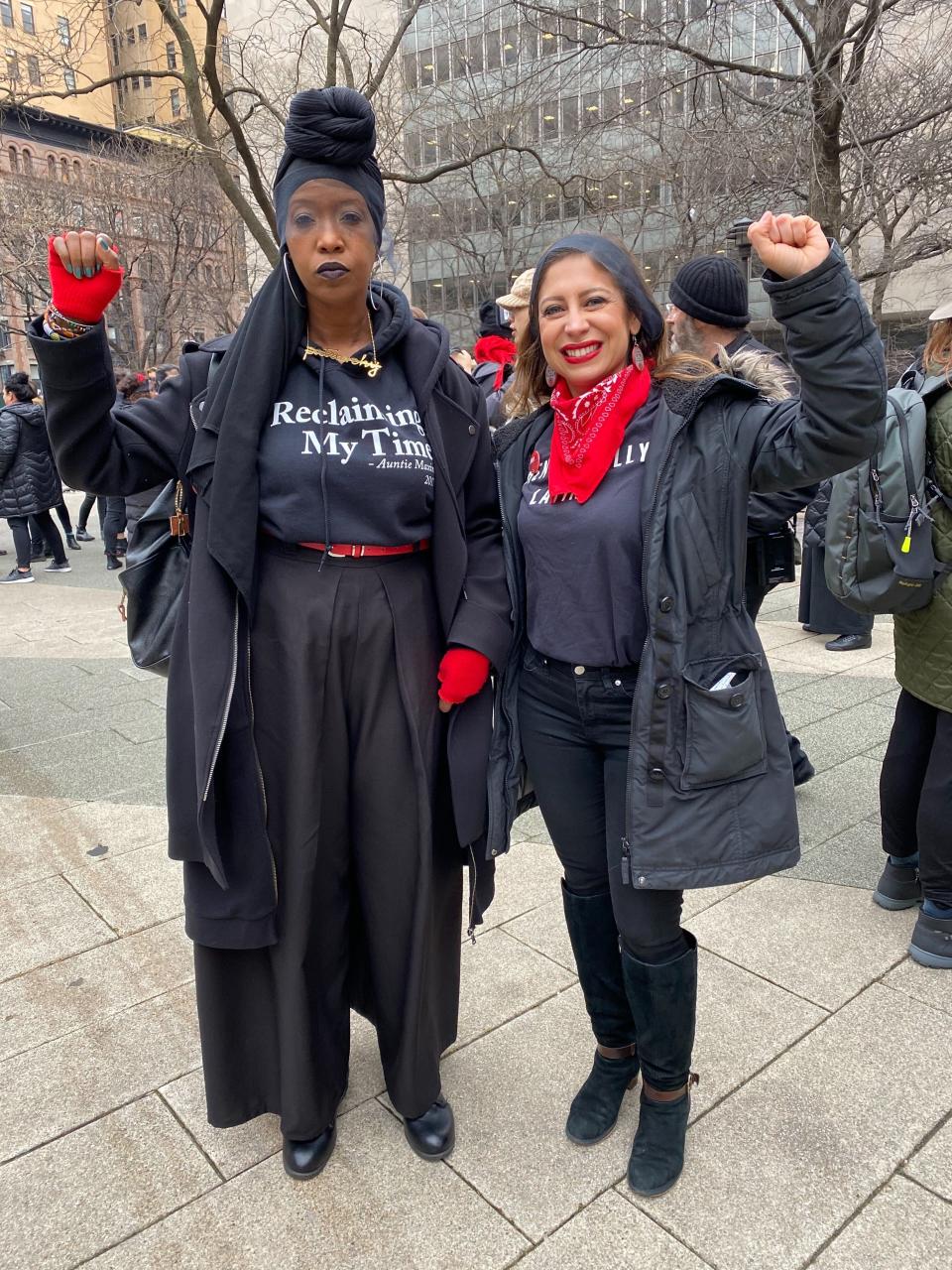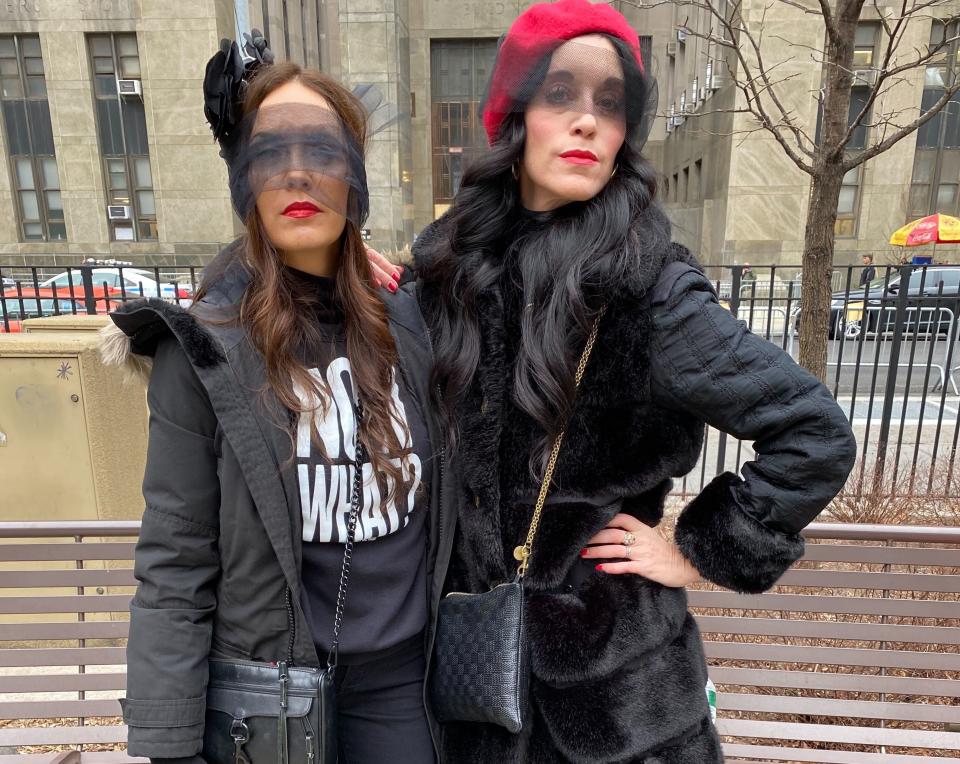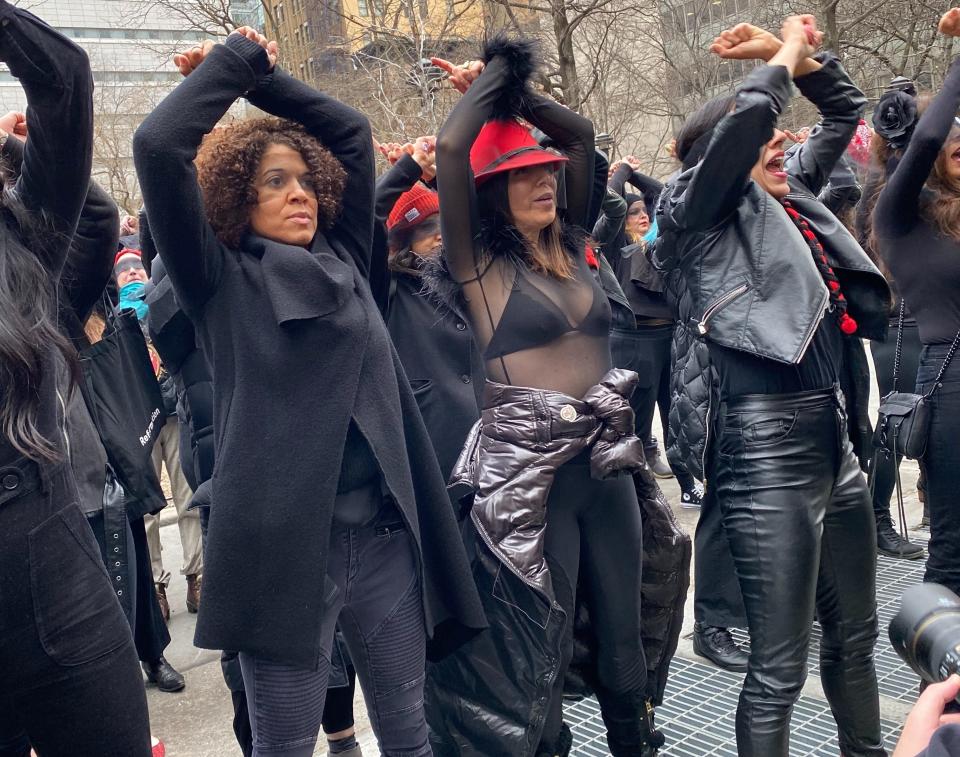Women Stage Flash Mob Protest Outside Harvey Weinstein Trial
NEW YORK ― If you were looking at the courthouse in New York City where disgraced Hollywood mogul Harvey Weinstein is currently on trial for multiple counts of sexual assault on Friday morning, it would have seemed pretty quiet.
But just across the street, something was brewing.
Dozens of women had gathered in the park facing the courthouse. They were a diverse group, wearing black with accents of red, many of them tying black mesh around their eyes and carrying totes emblazoned with “TIME’S UP” and Dolores Huerta quotes. Just before 11 a.m., they marched out of the park and lined up, faced the court and began to chant.
“Patriarchy is our judge that imprisons us at birth! And our punishment is the violence you don’t see,” the women sang in unison as they swayed back and forth in a choreographed dance.
“The rapist is you. It’s the cops. The judges. The state. The president.”
The song they were singing, “Un Violador en Tu Camino” (which translates to “A Rapist in Your Path” in English), was written by LasTesis, a feminist performance group based in Chile. It was first performed publicly in Chile in November 2019 in the midst of the country’s nationwide uprising against inequality. The video footage of the flash mob spread quickly, and “Un Violador en Tu Camino” has since been performed around the world in London, Mexico City, Paris, Berlin, Bogota and Barcelona.

Activists Paola Mendoza, Yara Travieso and Sarah Sophie Flicker first saw video footage of “Un Violador en Tu Camino” last month. As the performance grew in popularity within Chile and then moved to other countries, Mendoza, an artist based in New York City, emailed choreographer and director Travieso and Flicker, a creative director and artist.
“It was very moving to see a group of women come together in their own terms and talk so openly, blatantly, and boldly, and fiercely about rape culture,” Mendoza said. “I was like, ‘Let’s do it in New York. Let’s translate it into English and let’s do it in New York.’”
And so they got to organizing, along with actor and activist Amber Tamblyn and the national organizing director of the Working Families Party, Nelini Stamp. They all reached out to their own networks and encouraged those attending to bring other women-identifying people.

The lyrics of “Un Violador en Tu Camino” express the philosophy of Argentinian theorist Rita Segato, which identifies fundamentally broken institutions rather than just poorly behaving individuals as the root of rape culture and sexual violence.
“We can say ... that this is not on us. This is on the system that doesn’t protect us, and doesn’t protect our basic human rights,” said Travieso, who sees the words of “Un Violador en Tu Camino” as almost a mantra.
The focus on systems that perpetuate violence against women over singular monsters is why Mendoza, Flicker and Travieso found the song so powerful in this current moment.
“It is much larger than one man committing a horrific crime, this is a systematic problem,” Mendoza said. “And so it’s not just about the Harvey Weinstein trial, though he represents something specific in the United States. It’s about something that’s bigger than that.”
Yasmeen Hassan, the global executive editor of Equality Now, was one of the women in attendance. She told HuffPost that she sees the Weinstein case as symbolic, “the epitome of what led to the Me Too movement.”
“Justice systems nowhere work for survivors,” Hassan said. “We want to show solidarity with survivors all over the world and we want to push for reform of the justice system to better serve survivors in their quest for justice.”

This is also why Mendoza, Flicker and Travieso decided to stage the flash mob protest in multiple locations across the city. After performing “Un Violador en Tu Camino” outside of the courthouse, the group planned to reprise the performance on the subway, then move to their final destination: the Trump Hotel by Columbus Circle. (President Donald Trump has been accused of sexual misconduct or assault by more than 40 women to date.)
“Since 2016, women have been the punching bag of the administration,” Mendoza said, “and so [this protest] is a way for us to gather our strength, and to gather our solidarity, and be bold and fierce for the year that lies ahead, which we know will be difficult.”
″[This is us] saying to the administration and to the system that we are not going to be silent, and we’re not going to just take it,” she continued. “We’re going to fight back, and we’re going to fight back with dignity and love and sisterhood and lots of strength.”
Love HuffPost? Become a founding member of HuffPost Plus today.
Related...
In 2019, Me Too Sparked More Change, But Not Nearly Enough
As Weinstein's Trial Begins, His Accusers Call Out Bad Men For Making Comebacks
The Testimony That Could Seal Harvey Weinstein’s Conviction
This article originally appeared on HuffPost.
